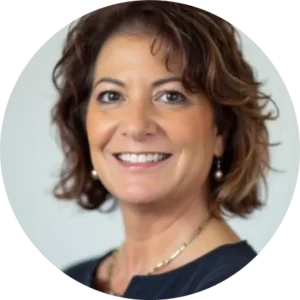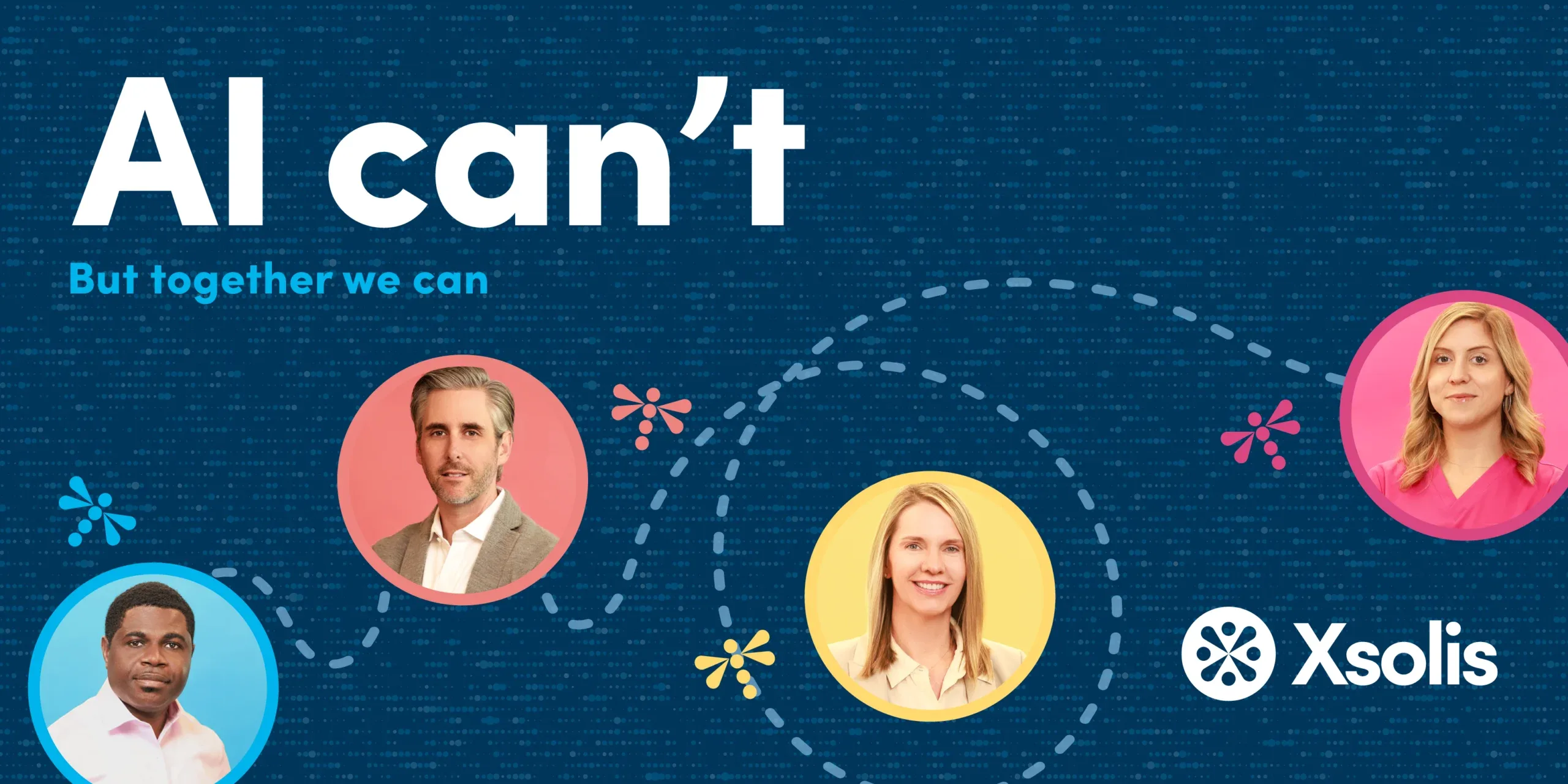The Xsolis approach to human-centered AI
Artificial intelligence (AI) can do amazing things — automate tasks, crunch data, and generate reports with lightning speed. Skeptics have slowly come around, with nearly every healthcare executive (96% of those surveyed by EY) saying they now see AI as a positive force in their workplace.
This is due, in some part, to AI dominating headlines and every major healthcare or technology conference for the last couple of years. AI is everywhere. And every company is an AI company now — or is working to add an AI tool to their lineup.
The Gartner Hype Cycle indicates that the healthcare industry is currently at the “Peak of Inflated Expectations” when it comes to AI, with generative AI being the primary technology experiencing this hype. The reality is that many vendors are relatively new to the AI space. As a result, expectations may not yet be fully aligned with AI’s current capabilities, setting the stage for a potential “Trough of Disillusionment” as reality sets in.
At Xsolis, we’ve taken a different approach that is rooted in over a decade of experience developing practical AI solutions for healthcare.
We understand that not all problems can be solved by AI alone. And nurses are right to push back against technologies that override their clinical expertise or that degrade their patients’ experience. Because there are critical human skills and emotional connections that technology will never be able to replicate. For example …
AI can’t appropriately model the real-life experience gained by clinicians during 4-10 years of medical school and residency programs.
AI can’t “see” a patient — their expressions weighed against their voice, body language, and situational awareness — to know their true clinical picture.
AI can’t build trust and rapport with family members whose loved one is in hospice care. And it should certainly never be the one to deliver emotional news or diagnoses, nor should it establish or communicate life-altering treatment plans.
AI can’t accurately detect the complex interplay and politics of a health system and its referral partners, to know how to smoothly navigate a patient’s care journey.
AI can’t talk a patient off the ledge when they are upset about a billing issue.
AI can’t replicate a caregiver’s human touch.
These are the kinds of real-world situations that require the creativity, empathy, and deep clinical expertise that only human healthcare professionals can provide. No matter how advanced the technology, AI alone simply can’t emulate the nuanced decision-making and problem-solving abilities of seasoned clinicians.
That’s why, at Xsolis, we’ve developed our industry-leading AI solutions with the human experience at the forefront. Our Dragonfly platform is designed to elevate and empower healthcare professionals, not replace them. That’s because AI, together with people, process, and technology, are better together. We have focused our 12-year tenure improving medical necessity decision-making — the mid-revenue cycle area of concurrent authorizations during the utilization management process — and expanding those capabilities with AI-guided clinical summaries for initial reviews and appeal letters, length of stay optimization, and revenue integrity. Xsolis’ Chief Medical Officer is an M.D. and oversees our data science team to ensure we lead AI development from the clinician’s perspective.
By practically applying AI to solve operational challenges, we’ve been able to deliver tangible, measurable results for our clients year after year.
Staffing shortages are no match for the right AI tools
![]() “Xsolis’ AI-driven technology has allowed our utilization review team to support 140% more patients a day, which is incredibly important given the staffing challenges in the healthcare industry,” said Heather Wagner, Director of Utilization Review and Case Management at Beacon Health System. These sorts of wins have created more than $95 million in savings for the health system since they began using Xsolis’ solutions.
“Xsolis’ AI-driven technology has allowed our utilization review team to support 140% more patients a day, which is incredibly important given the staffing challenges in the healthcare industry,” said Heather Wagner, Director of Utilization Review and Case Management at Beacon Health System. These sorts of wins have created more than $95 million in savings for the health system since they began using Xsolis’ solutions.
By automating repetitive administrative tasks, Dragonfly frees up nurses and case managers to focus on higher-level, patient-centric work that requires their unique clinical skills and compassion.
Do more with less, gain focus and meaning
 “Xsolis’ AI isn’t taking the place of our clinicians, but rather it’s like an additional team member to assist our staff in making better, quicker decisions to improve patient outcomes,” said Brandie Anderton, RN, BSN, MSN, Director of Inpatient Case Management at Carle Health.
“Xsolis’ AI isn’t taking the place of our clinicians, but rather it’s like an additional team member to assist our staff in making better, quicker decisions to improve patient outcomes,” said Brandie Anderton, RN, BSN, MSN, Director of Inpatient Case Management at Carle Health.
Xsolis’ human-in-the-loop approach to AI also helps break down the silos between payers and providers, fostering unprecedented collaboration.
“Collaborating with health plans using Xsolis’ AI-powered platform allowed us to move beyond discussing criteria and instead have a meaningful conversation focused on the patient,” said Dr. Debbie Schardt, AVP of Revenue Cycle and Utilization Management at MultiCare Health System.
 “The Xsolis platform helps us make strategic decisions. It enables our staff to work more efficiently at the top of their licenses, and it fosters an environment of greater employee engagement,” said Dr. Schardt.
“The Xsolis platform helps us make strategic decisions. It enables our staff to work more efficiently at the top of their licenses, and it fosters an environment of greater employee engagement,” said Dr. Schardt.
Leadership at one of MultiCare Health System’s connected, Managed Medicaid health plans agrees with Schardt that achieving payer-provider collaboration between their two organizations has been essential.
“[Since deploying the platform,] our relationship with MultiCare has gotten a lot closer, and it’s become a good working relationship,” said a nurse manager for the health plan. “We work collaboratively, and it feels like we’re on the same team, even when we step away from the table.”
AI is a tool, you are the expert
At the end of the day, AI alone can’t solve healthcare’s most pressing challenges.
But AI, together with the right people and processes, can redefine the industry for the better.
 As Hoa Cooper, Vice President of OSF Care Management, puts it, “You are the expert. This is a tool. As much as I love Xsolis, they’re not going to solve all our problems. I think sometimes we make the mistake that the tool is going to fix everything; it isn’t. So, we must have good processes, accountability, and buy-in to make it work.”
As Hoa Cooper, Vice President of OSF Care Management, puts it, “You are the expert. This is a tool. As much as I love Xsolis, they’re not going to solve all our problems. I think sometimes we make the mistake that the tool is going to fix everything; it isn’t. So, we must have good processes, accountability, and buy-in to make it work.”
That’s the philosophy that has guided Xsolis’ approach since 2013. We’re committed to developing and servicing AI solutions that prioritize the human experience.
“It’s critical (for vendors) to include a team member who can speak from a clinical perspective, to help connect the dots as they understand the role of UM nurses,” said Brandie Anderton, RN, BSN, MSN, Director of Inpatient Case Management at Carle Health. “Clinical support for clients is vital, which Xsolis provides.”
Our offerings are road-tested, award-winning, and growing to help solve even more industry challenges by X’ing out silos.
But our guiding philosophy will remain the same — using the power of shared, objective data and predictive analytics to align healthcare professionals on what matters most and empowering them with more time and insights to directly serve patients.
Learn more about Xsolis’ Dragonfly suite of solutions.
Explore Solutions